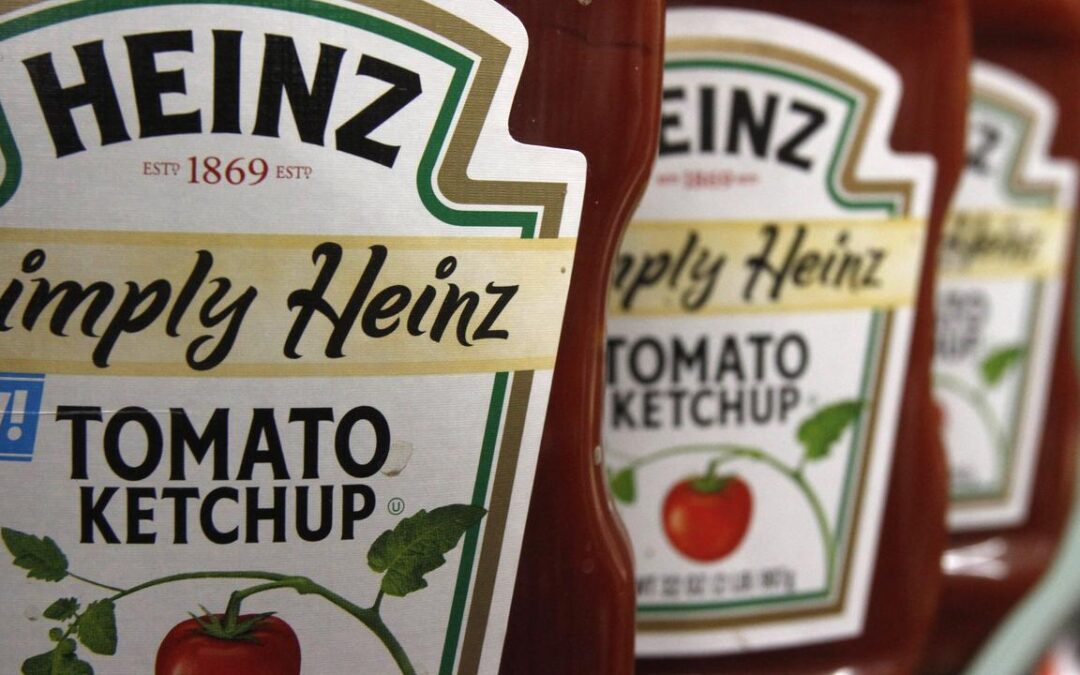
Kraft Heinz to split a decade after megafood merger
Kraft Heinz is splitting into two companies a decade after they joined in a massive merger that created one of the world’s biggest food companies.
One of the companies would include shelf stable meals and include brands such as Heinz, Philadelphia cream cheese and Kraft Mac & Cheese, Kraft Heinz said on Tuesday.
The other will include brands such as Oscar Mayer, Kraft Singles and Lunchables.
The names of the two companies will be released later.
Kraft Heinz said in May that it was conducting a strategic review of the company, signalling a potential split.
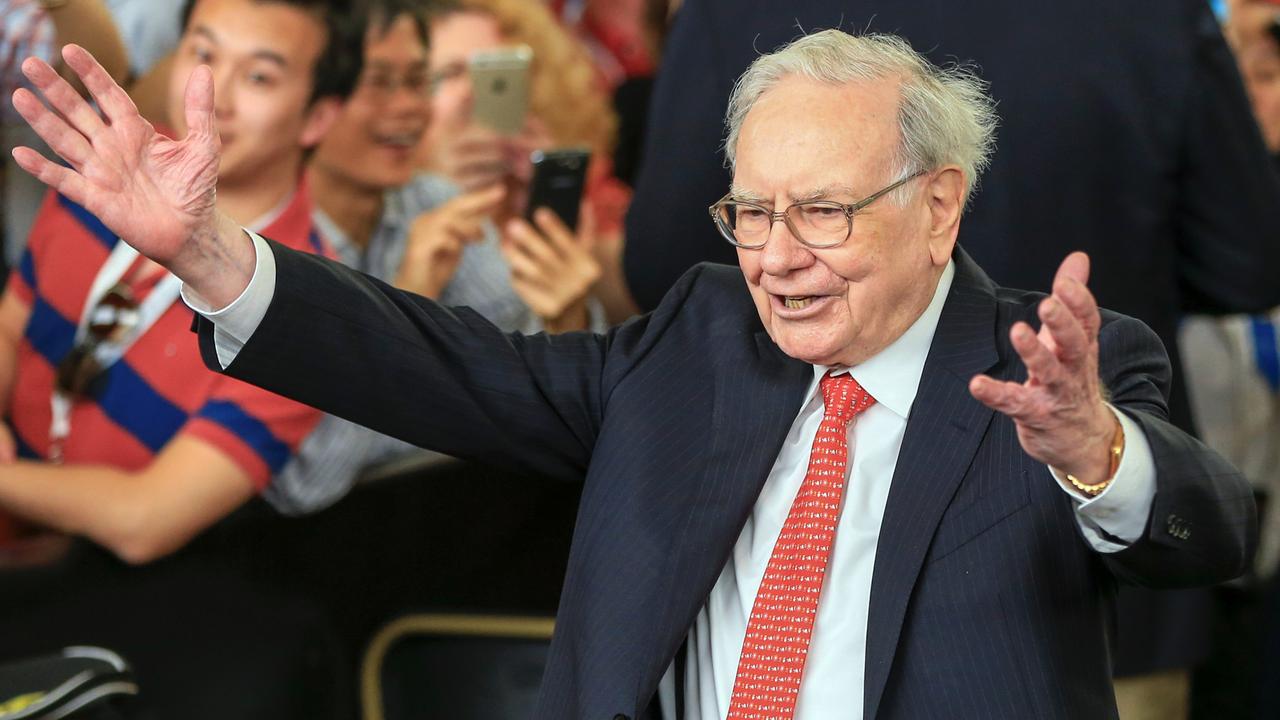
“Kraft Heinz’s brands are iconic and beloved, but the complexity of our current structure makes it challenging to allocate capital effectively, prioritise initiatives and drive scale in our most promising areas,” executive chair Miguel Patricio said in a statement.
The path to the merger of Kraft and Heinz began in 2013, when billionaire investor Warren Buffett teamed up with Brazilian investment firm 3G Capital to buy HJ Heinz Co.
At the time, the $US23 billion deal was the most expensive ever in the food industry.
3G known for strict cost controls and so-called zero-based budgeting, which requires all expenses to be justified each quarter.
The deal was intended to help Heinz, which was founded in 1869, expand sales of its condiments and sauces on supermarket shelves.
Heinz’s new owners also set about cutting costs, laying off hundreds of workers within months.
At the same time Kraft sought for a partner after a 2011 split from its snack division, which became Mondelez International.
In 2015, Buffett and 3G decided to merge Heinz with Kraft, creating the fifth-largest food and beverage company in the world, with annual revenue of $US28 billion ($A43 billion).
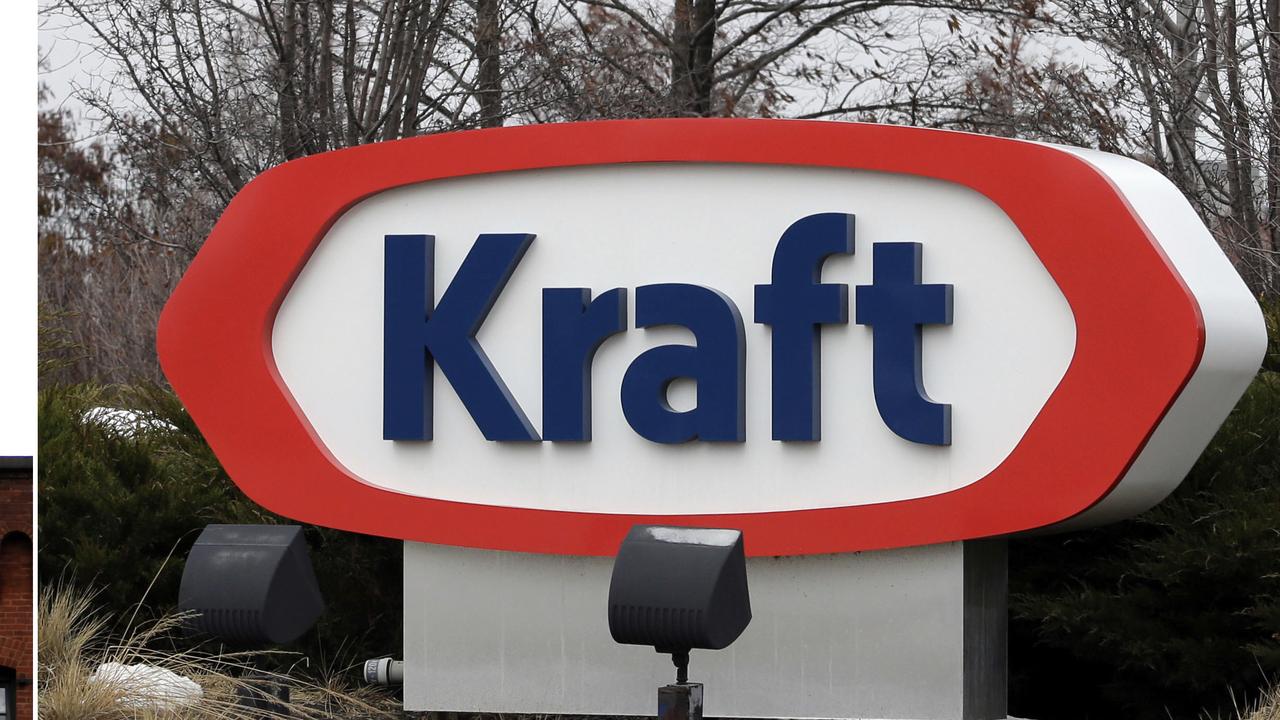
But the combined company struggled, despite lay-offs of thousands of employees and other cost-cutting measures.
Even at the time of the merger, many consumers were shifting away from the kinds of highly processed packaged foods that Kraft sells, such as Velveeta cheese and Kool-Aid.
In 2019, Kraft Heinz slashed the value of its Oscar Meyer and Kraft brands by $US15.4 billion, citing operational costs and supply chain problems.
But many investors blamed the company’s leadership, saying its zeal for cost-cutting was hurting brand innovation.
In 2021, Kraft Heinz sold its Planters nut business and its natural cheese business, vowing to reinvest the money into higher-growth brands.
But the company’s net revenue has fallen every year since 2020, when it had a pandemic-related bump in sales.
In April, Kraft Heinz lowered its full-year sales and earnings guidance, citing weaker customer spending in the US and the impact of President Donald Trump’s tariffs.
The transaction is expected to close in the second half of 2026.
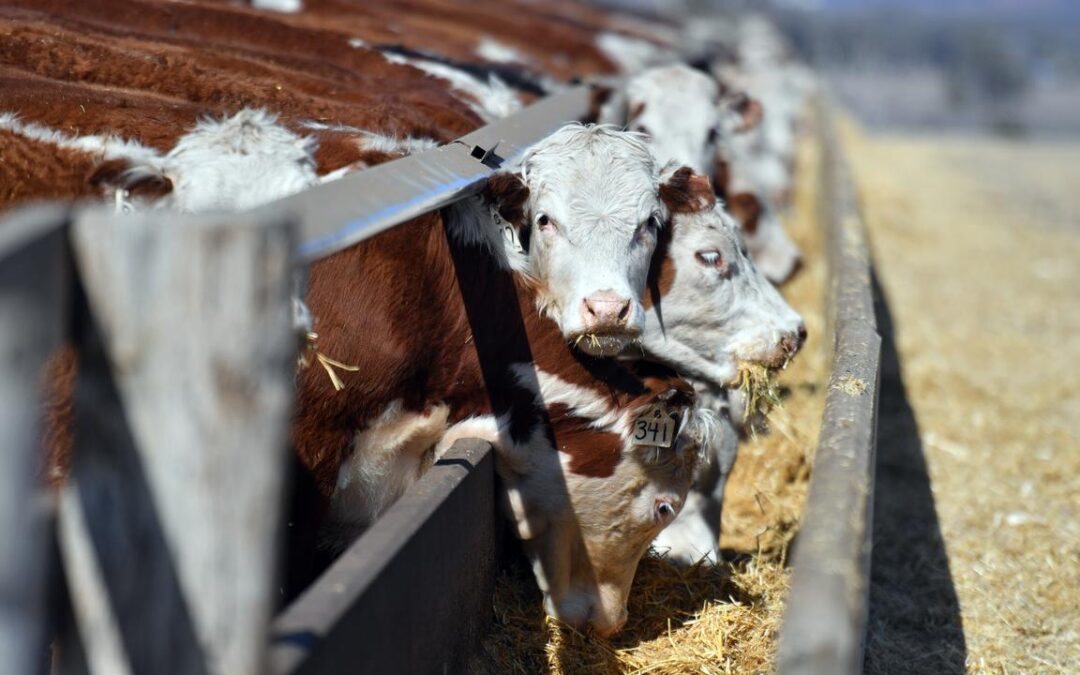
Record forecast set for Australian production
Soaring livestock prices are set to push Australia’s agriculture, fisheries and forestry production to record heights, eclipsing $100 billion.
Drought conditions in Australia have affected livestock supply, with the federal government’s commodities forecaster revealing there had been increased demand and high prices.
“We’ve seen high prices lately for both livestock and animal products, like beef, lamb and milk,” Australian Bureau of Agricultural Resource and Economics and Sciences’ Jared Greenville said.
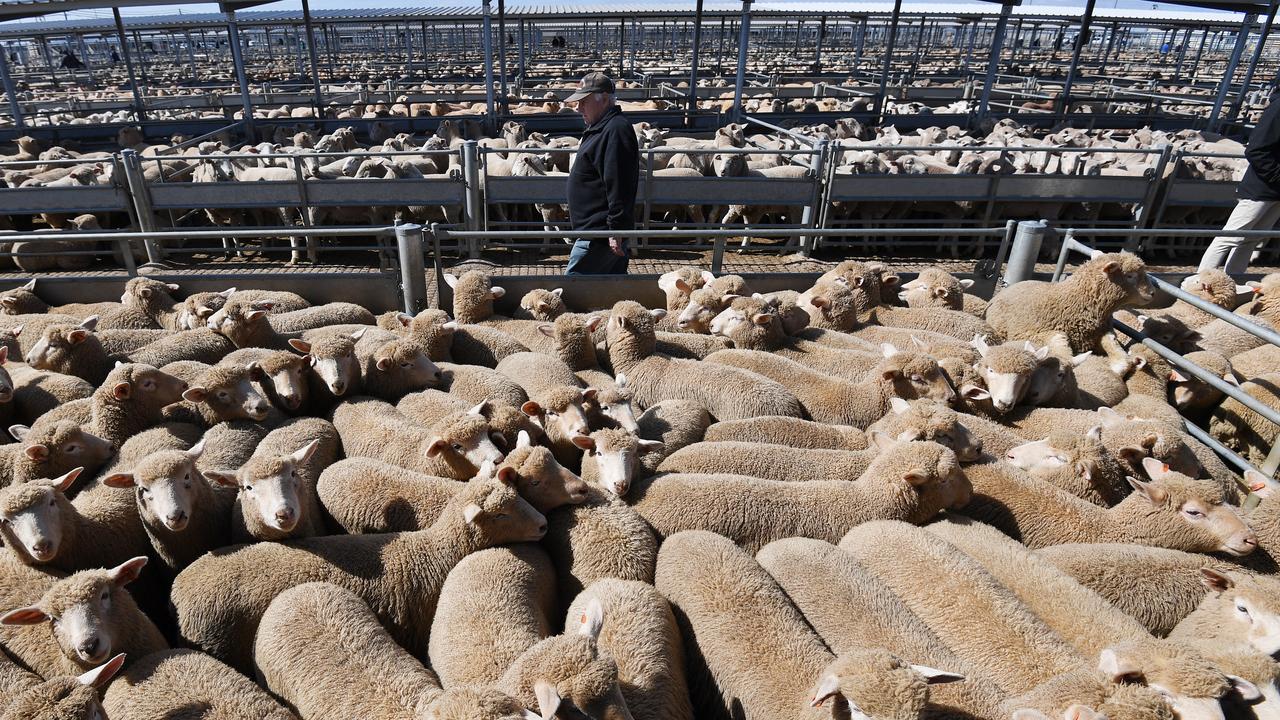
The forecaster’s commodities report for the September quarter predicts production is set to reach $101.6 billion in 2025/26.
The record production would eclipse the previous financial year by a whopping $7.3 billion.
Livestock production alone is set to reach $41.6 billion, bolstering the overall agricultural value to an expected record high of $94.7 billion.
It is a remarkable rise after the National Farmers Federation set a goal just seven years ago for the agriculture industry to be worth $100 billion by 2030.
The drought did appear to take its toll, with crop production down.
“Wheat production and value are set to fall as global prices and Australian yields decline slightly from last financial year,” Dr Greenville said.
Wheat production is still ticking along above the 10-year average, with a crop of almost 34 million tonnes forecast.
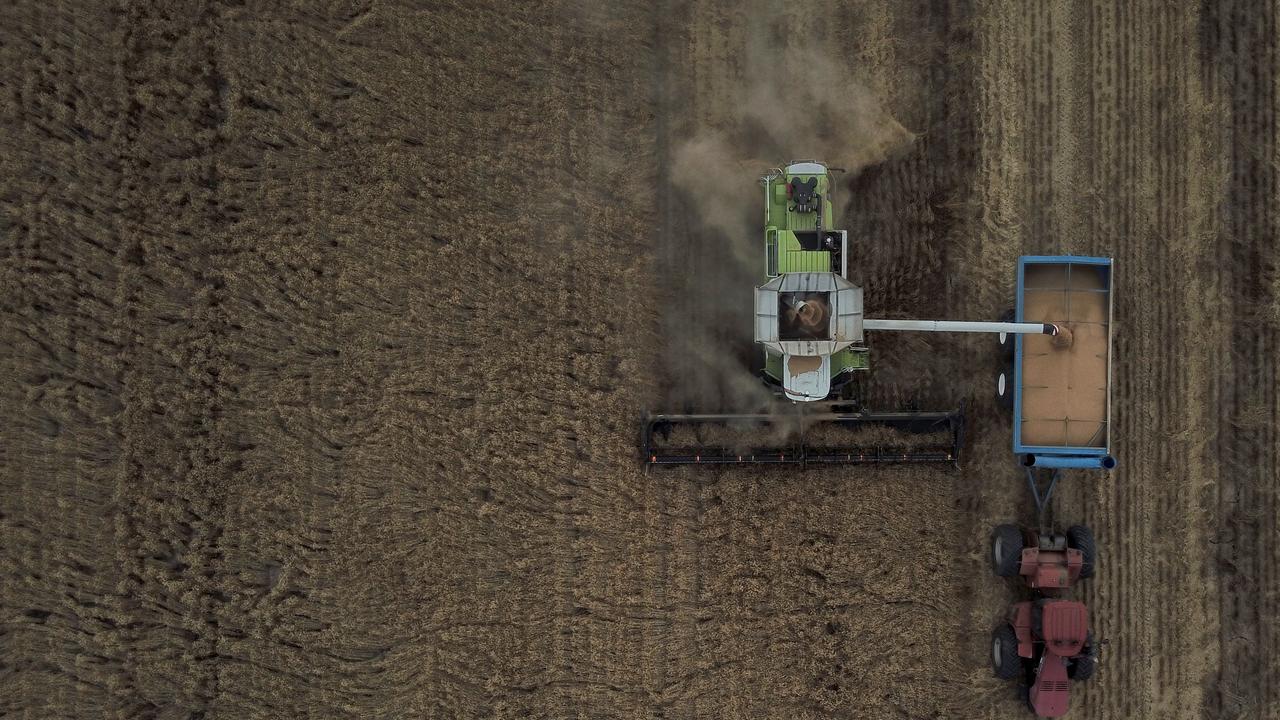
Rain had revived some regions but the forecaster had concerns for southern NSW due to a slow start to the winter cropping season and relatively low soil moisture levels.
Agricultural exports were expected to fall slightly in 2025/26 but were still “well above average” at $74.6 billion, Dr Greenville said.
Beef and sheep meat exports are set to take a hit but horticulture and wheat are set to rise.
“The global trading environment remains uncertain, but there is still strong international demand for Australian food and fibre from markets like China, Japan and the US,” Dr Greenville said.
Agriculture, Fisheries and Forestry Minister Julie Collins said hard work, resilience and farmers working hand-in-hand with government had to led to the record results.
“The continued growth in our agriculture, fisheries and forestry sector is good for our farmers, it’s good for our regional economies, and it’s good for our trade relationships,” she said.
“This record forecast is not only a result of increased demand for our world-class products, but what you can achieve when government works with industry to deliver for them.”
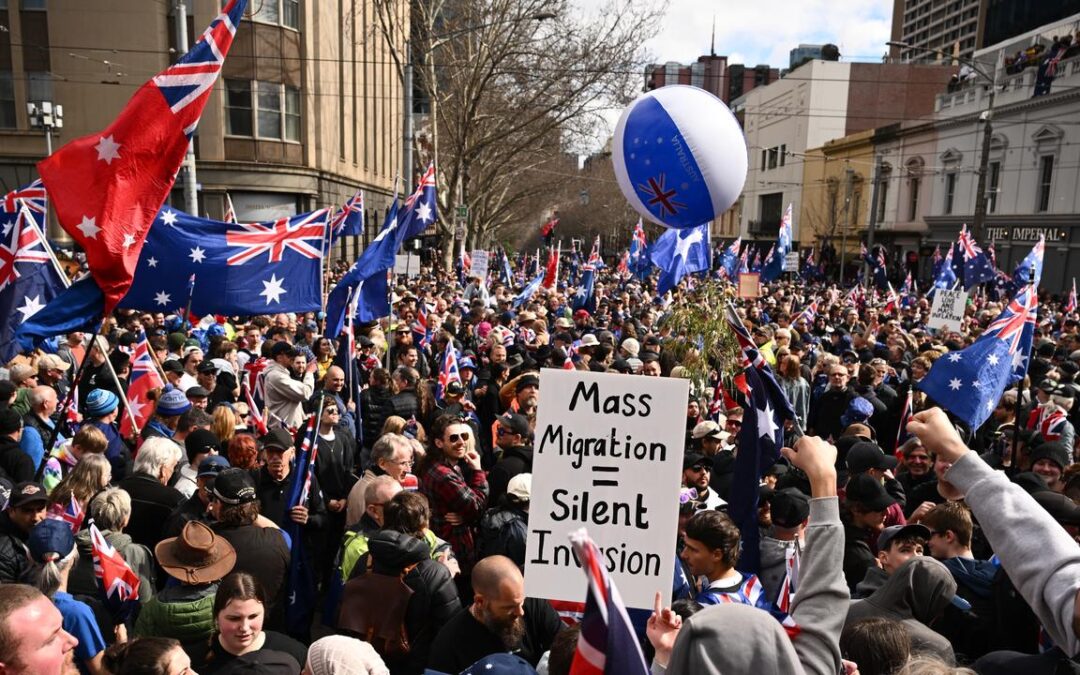
Violent protests fail to budge fresh immigration intake
Australia’s migration targets will remain unchanged despite violent protests demanding the nation’s permanent intake be slashed.
The permanent migration program intake for 2025/26 will be set at 185,000 people, the same as the previous financial year.
But the government has been criticised for delaying its decision to announce what the intake rate would be, with the opposition saying Labor failed to address areas of concern about migration.
The announcement of the intake levels follows anti-immigration rallies attended by thousands of people in capital cities across Australia on Sunday.
The decision to keep migration numbers on hold followed talks with states and territories, with a focus on skilled migration, Immigration Minister Tony Burke said.
Health Minister Mark Butler said the government needed to get the balance right on population growth with strains on housing and workforce shortages.
“I think there is a real tension between recognising that there are real pressures on our housing system and other parts of the economy,” he told Nine’s Today Show on Tuesday.
“While also, I know intimately, recognising we’re really struggling to get the workers we need to deliver the hospital services, the aged care services and build the houses we need.”
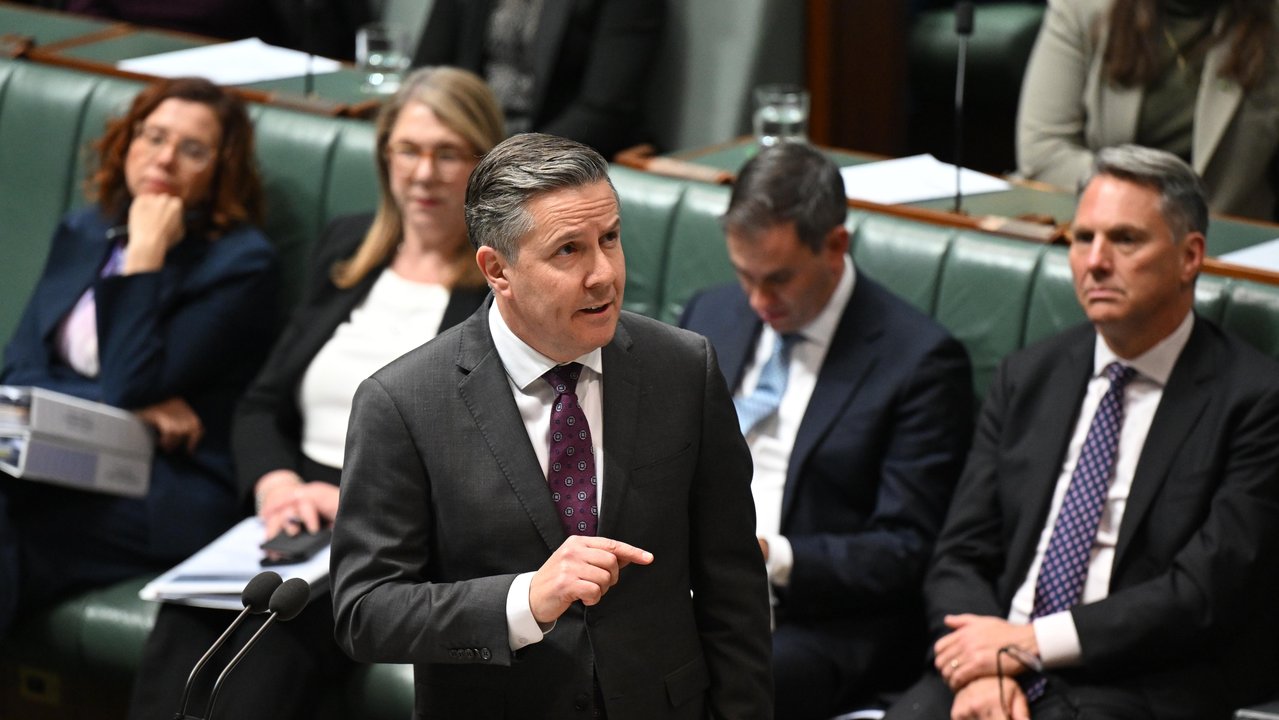
But opposition immigration spokesman Paul Scarr said the government’s decision to unveil the updated target more than two months into the financial year was an “unacceptable” delay that showed Labor had no plan.
“There is no explanation regarding how this announcement of the permanent migration intake reflects the very real pressures facing modern Australia,” he said.
“Families are struggling to find a home, communities are feeling the strain and the cost of poor planning is being carried by every Australian.”
Pandemic-era border closures caused the net overseas migration figure to plummet.
When borders reopened, an influx of international students caused the net increase to surge to a record high of 536,000 in one year.
Neo-Nazi Thomas Sewell, who addressed a rally in Melbourne and was shown in footage attacking an Aboriginal camp, crashed a press conference being held by Victorian Premier Jacinta Allan on Tuesday.
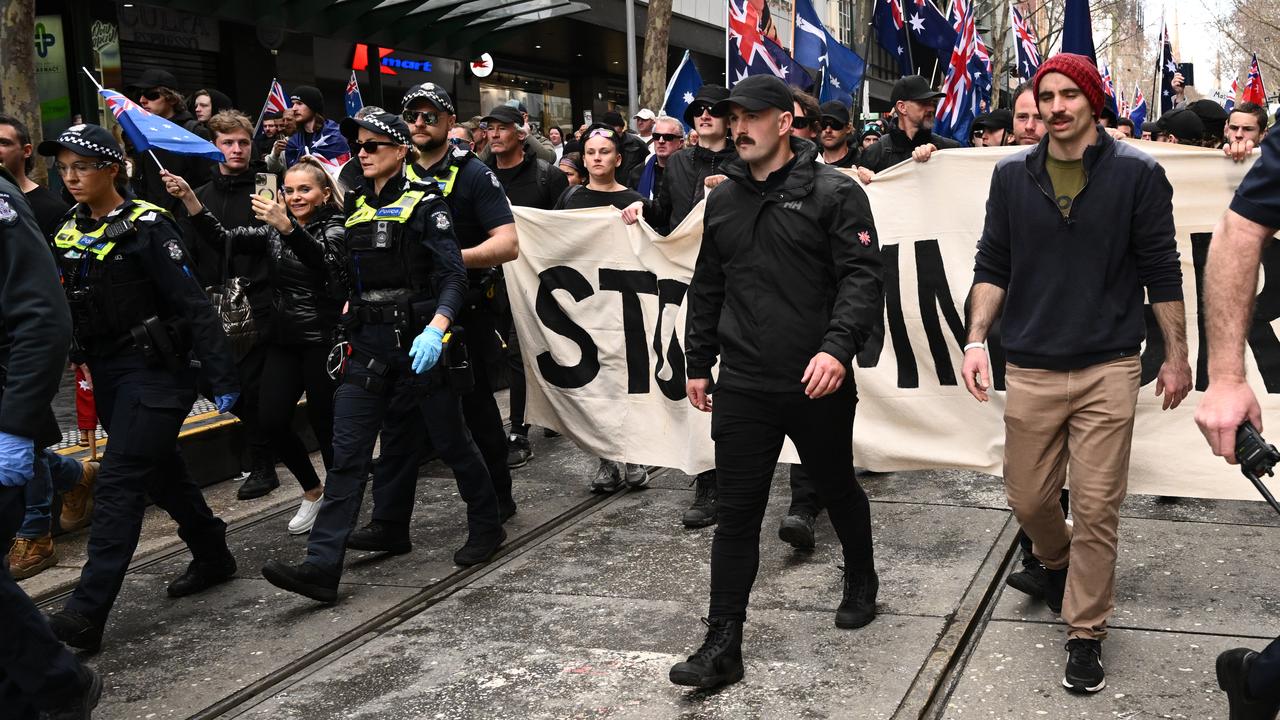
He continued to shout about Australians being denied the right to protest as he was led away by police officers.
Prime Minister Anthony Albanese said the prominence of neo-Nazis at the rallies needed to be confronted.
“We have to make sure we give people space to move away and to not push them further down that rabbit hole,” he told a Labor Party room meeting in Canberra.
“A lot of these fears are being reinforced online and we have challenges with polarisation.”
Independent senator David Pocock and former Immigration Department deputy secretary Abul Rizvi said the government had left a vacuum for unsavoury elements, including neo-Nazis, by failing to show leadership and properly explain its immigration plan to the public.
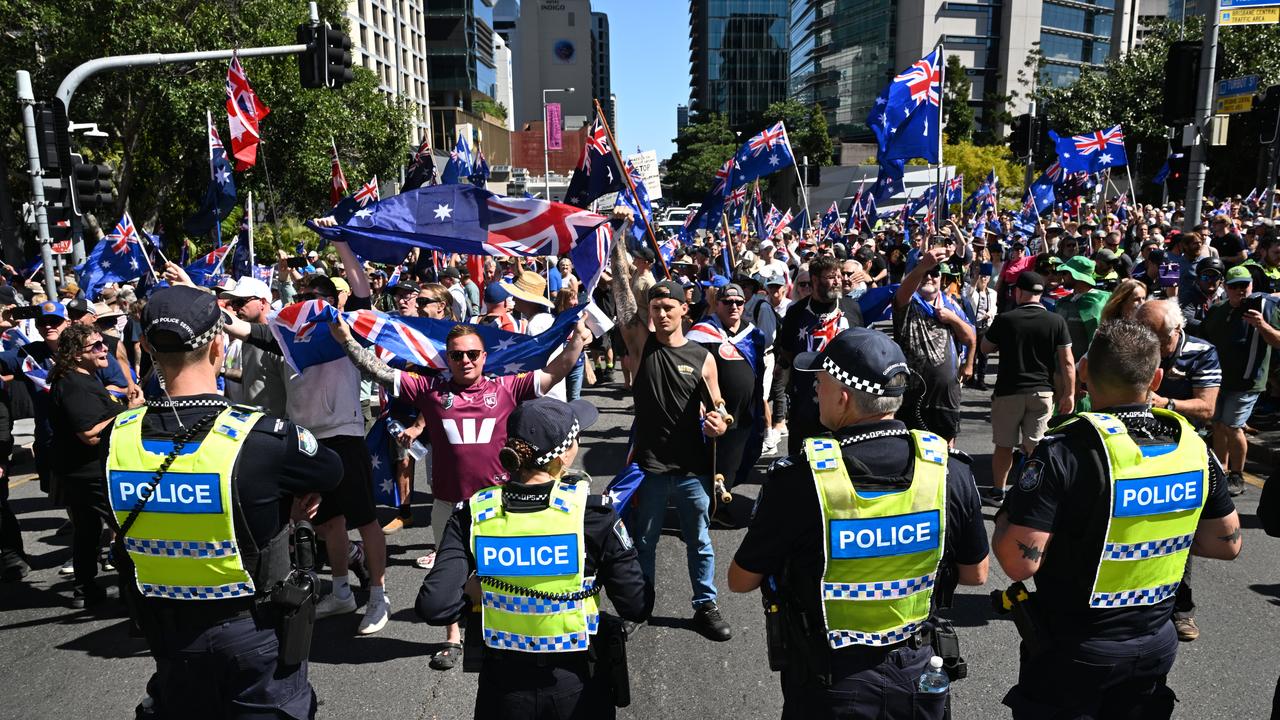
The rallies have been widely condemned because of the presence of neo-Nazis, but politicians including One Nation senator Pauline Hanson and Queensland MP Bob Katter joined marchers.
While only a small contingent of the people who showed up identified as white nationalists, terrorism expert Levi West said there was an overlap that extremists could exploit.
“A rally that has a presence from a group like the neo-Nazi organisation presents a prime opportunity for recruitment,” said Dr West, a research fellow at the Australian National University.
Simon Welsh, director of research at pollster Redbridge, said surveys and focus groups were picking up concerns among the general public about the size of Australia’s migration intake, in the context of the housing affordability crisis.
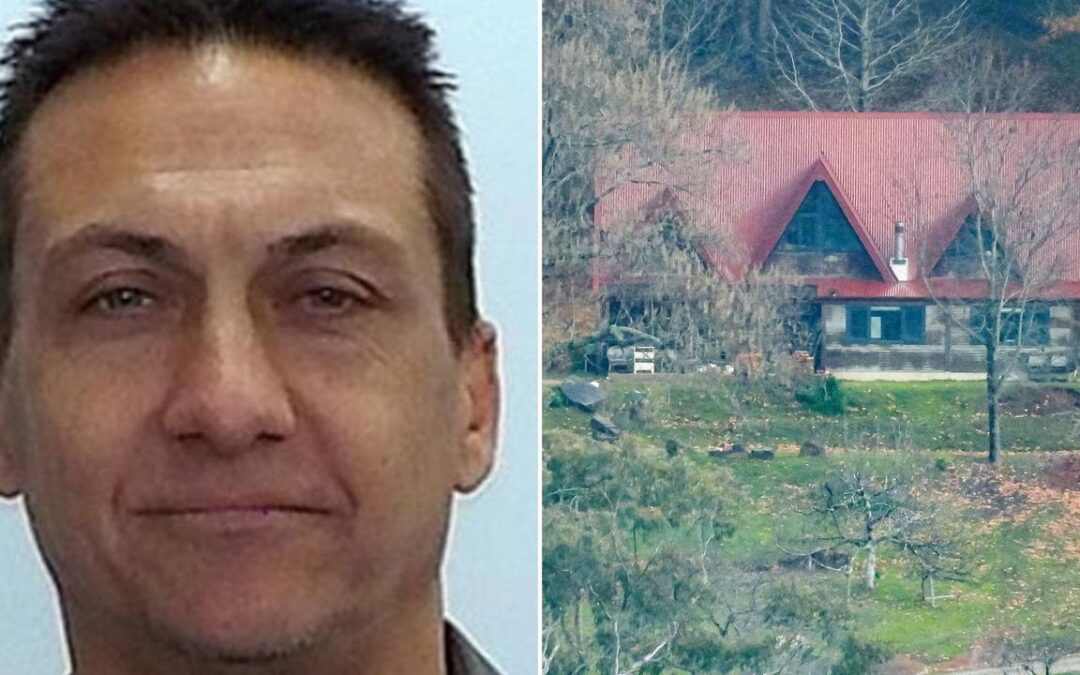
Public information about accused cop killer floods in
A “remarkable” amount of information on an accused police killer has been provided to investigators as the force explores a reward for details leading to his capture.
Dezi Freeman, 56, has been on the run since August 26 following a deadly confrontation at his property in Porepunkah, about 300km northeast of Melbourne.
Police officers Vadim De Waart, 35, and Neal Thompson, 59, were killed and a colleague badly injured.
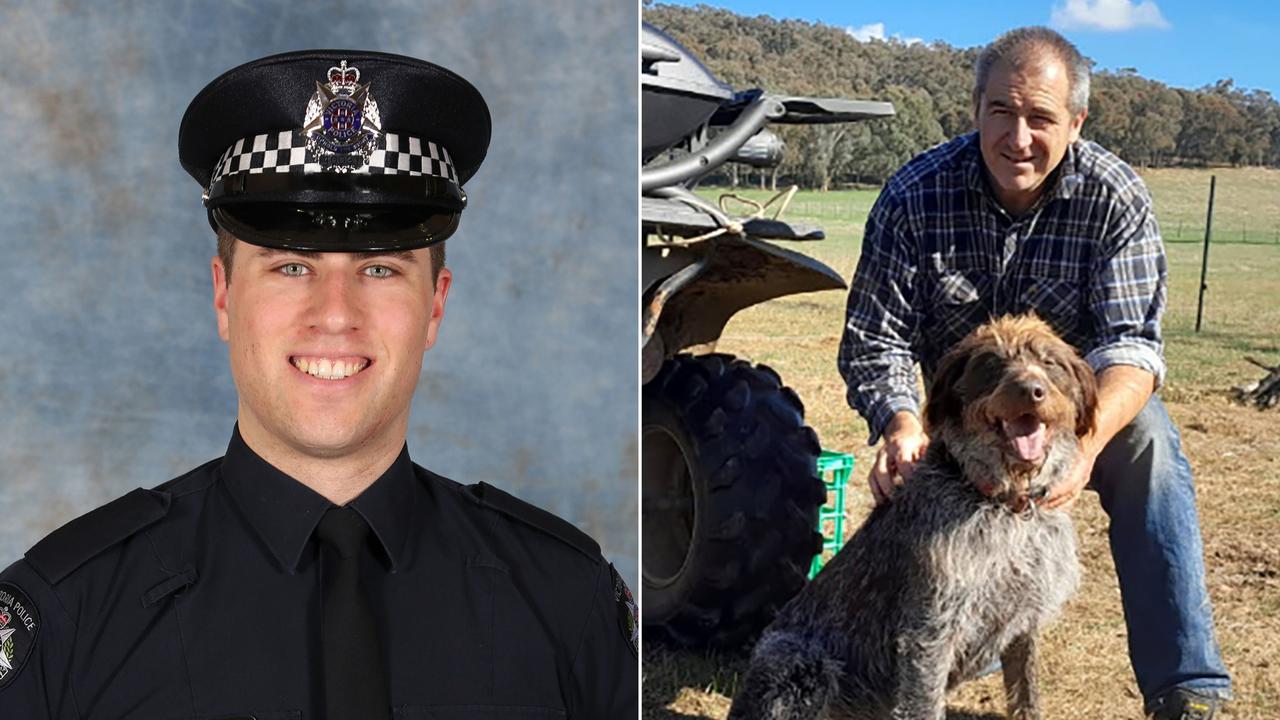
More than 400 police are searching for Freeman on foot and by air across Victoria’s high country.
Locals have been warned not to approach the fugitive because he might be armed.
Police believe people know the whereabouts of Freeman.
Superintendent Brett Kahan revealed members of the public had been very forthcoming since a fresh public appeal on Monday.
“The amount of information we’ve received in the last 18 hours since speaking to the media has been remarkable,” he told ABC Radio on Tuesday.
He said police were not considering a reward for information leading to his capture but “that’s an avenue that police will explore”.
Former homicide detective Charlie Bezzina said the scale of the search operation would be challenging to maintain.
“Financially, it’s a major impact on the operating budget of Victoria Police,” he told AAP on Tuesday.
“I would hope to see some assistance from the (Victorian) government because if it comes out of the operating budget, there’s got to be resources cut elsewhere.”
As the search enters a second week, Mr Bezzina said difficult discussions would be needed about potentially scaling it back.
Any decision, in weeks or months, would likely take into account several factors, including whether authorities believed he could survive in the bush or was still in the area.
“It will be a very, very difficult call for police command,” Mr Bezzina said.
“It’s difficult because it’s damned if they do, damned if they don’t.”
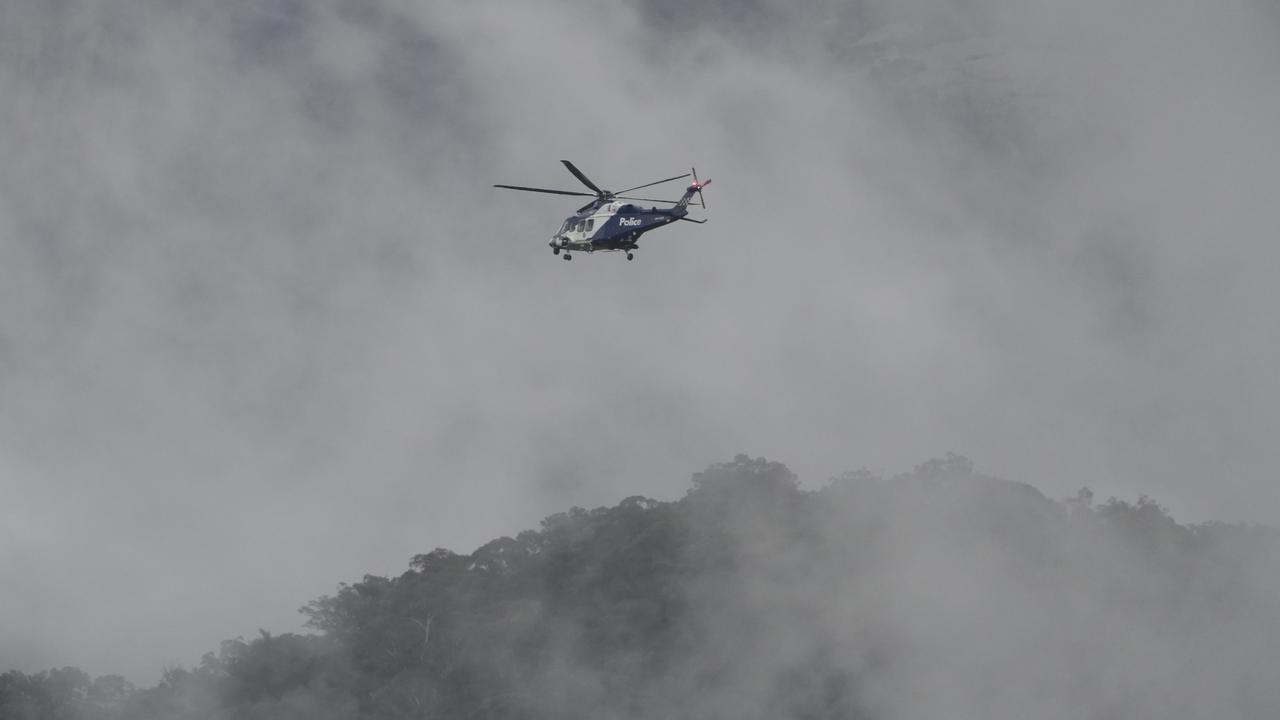
Victoria Police is yet to ask for any additional financial support as part of the manhunt, AAP has been told.
Police Minister Anthony Carbines on Thursday said the state government was ready to provide anything extra the force needed.
High-tech equipment, including a police helicopter with infrared and thermal cameras that can detect heat through dense bushland, is being used in the search.
Michael Coates, an experienced drone search and rescue operator, believes the accused killer has found shelter or moved out of the area.
“If the person is in a cave or a rock ledge or in a mine shaft and they’ve got no visible presence to the sky, then they basically remain unrecognised as there is no way of seeing through the ground,” he said.
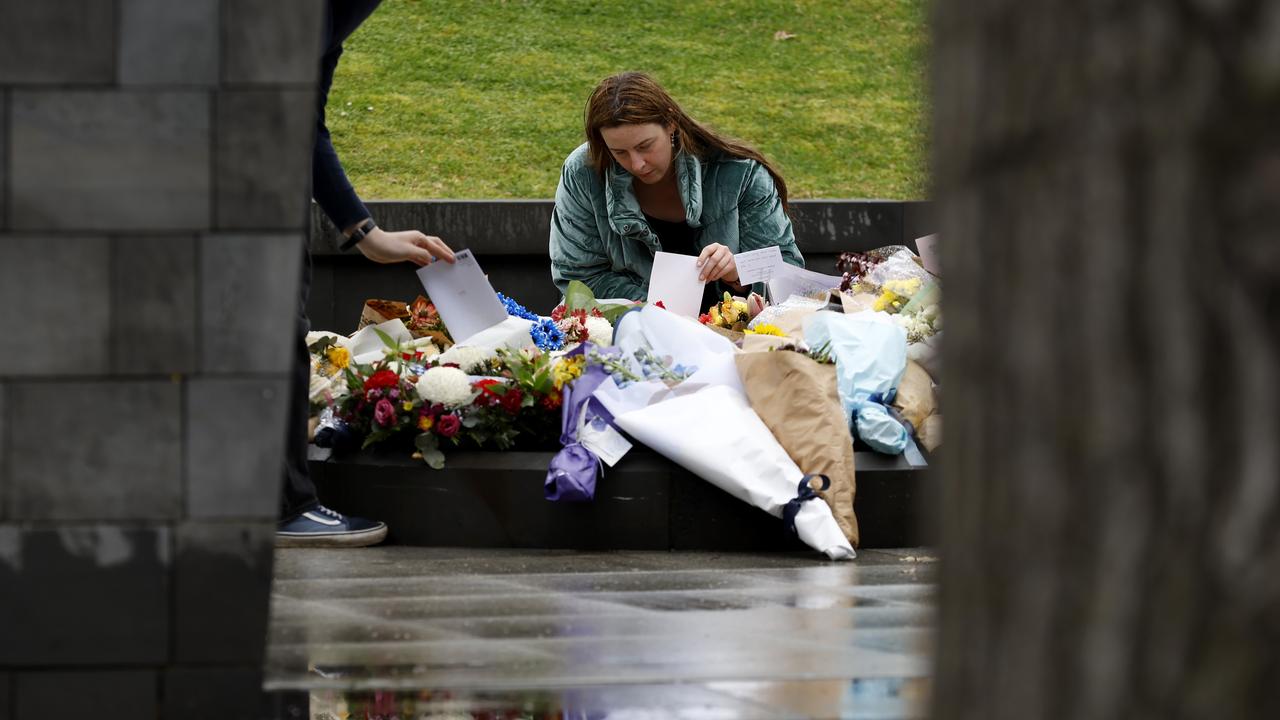
Freeman may have stashed food and water but his survival would be hampered by efforts to stay hidden, Mr Coates said.
The town of Porepunka is slowly beginning to reopen.
The Porepunkah Pines Holiday Park resumed normal trading on Tuesday after an “incredibly heavy” week.
Marty Robinson, a family friend who has known Dezi Freeman for about 30 years, said the police deaths left a mark on the town.
He runs Marty’s Porepunkah Garage and said most of his bookings were cancelled last week and business is still quiet.
Senior Constable De Waart will be farewelled on Friday, followed by a funeral for Detective Senior Constable Thompson on September 8.
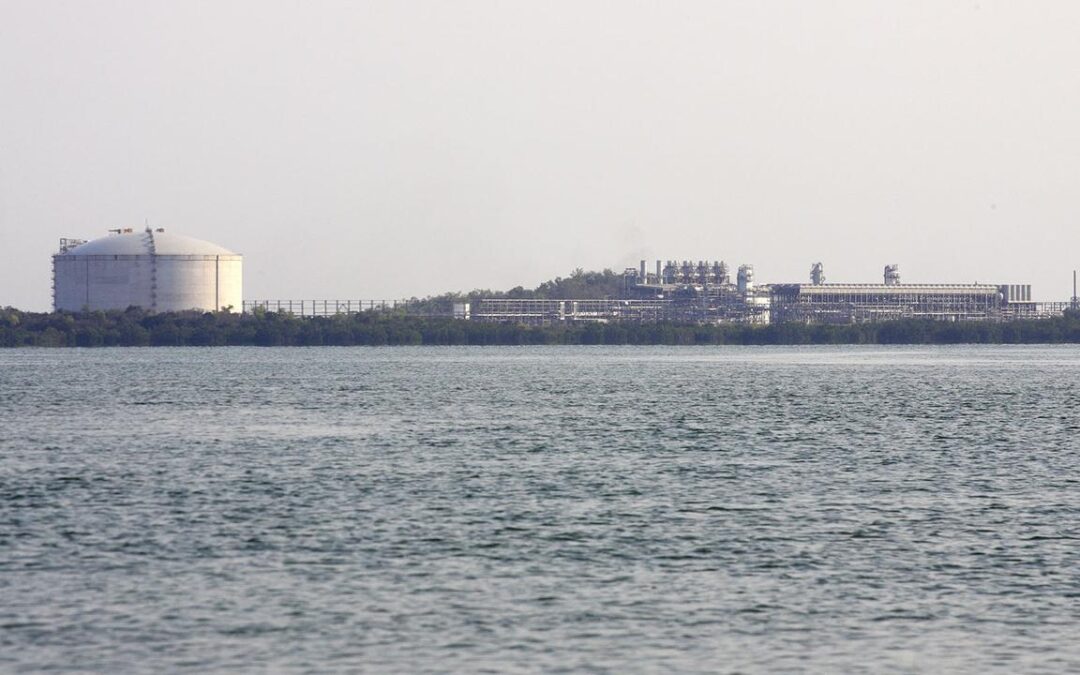
MPs demand Santos fix gas tank, leaking for 19 years
Repair options are being discussed for a major gas export hub’s storage tank that has been leaking methane for almost 20 years, after sparking commonwealth concern.
The Santos-operated Darwin liquid natural gas facility has been emitting the harmful greenhouse gas since it was built in 2006 by ConocoPhillips Australia.
The Northern Territory government has been aware for 19 years of the leak, which was caused by small welding abnormalities, with emissions found to be up to 184kg/hr.
NT Environmental Protection Authority chair Paul Vogel said on Tuesday the department would discuss possible solutions with Santos, including the cost to repair the tank and whether it would reduce emissions.
“There is a process and a procedure in place whereby they (Santos) have to identify what can be done that doesn’t pose a risk to workers and is going to yield an environmental benefit,” he told ABC Radio.
The leak is insignificant and accounts for about one per cent of the facility’s total emissions, Mr Vogel said.
The tank cost hundreds of millions of dollars, and if it is deemed too risky or costly to fix, the leak may have to be managed, he said.
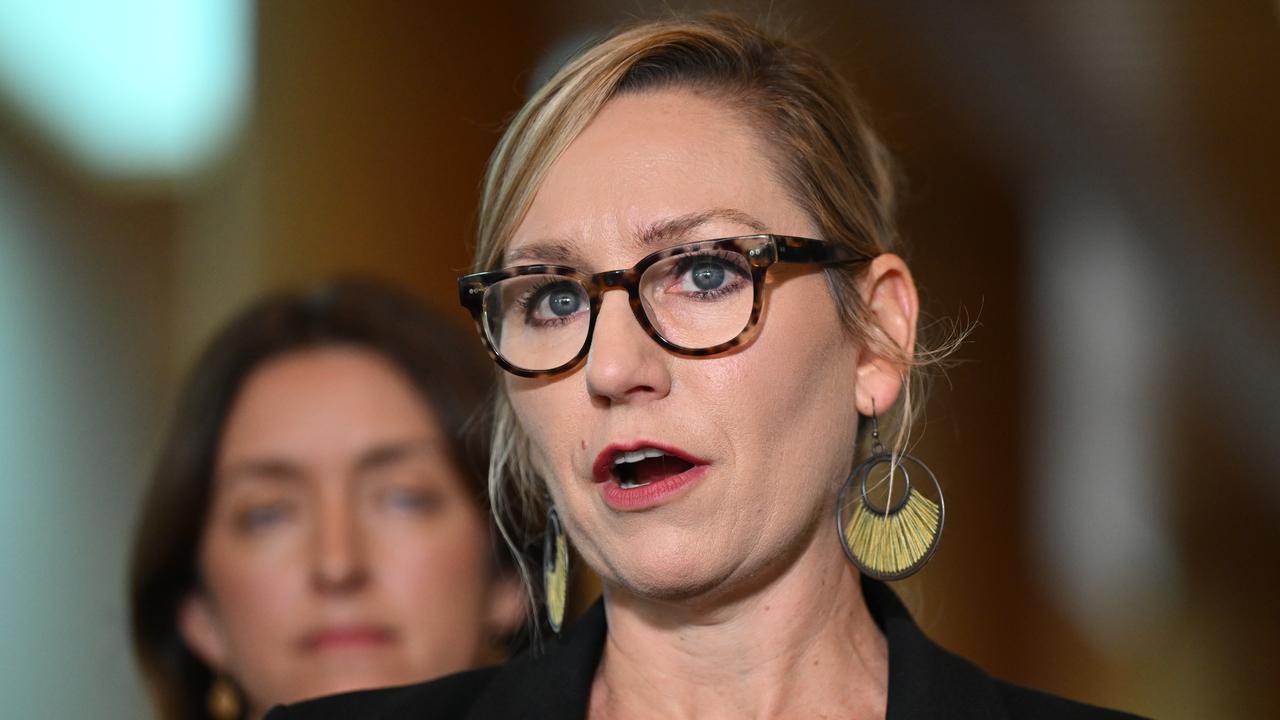
The authority said it did not previously report the leak to the public because the levels of methane being emitted from the tank “do not pose any risk of explosion and negligible risk to human health or the environment”.
It continues to regulate the facility and carries out annual inspections of it.
Greens leader Senator Larissa Waters called on the federal government to order Santos to fix the leak before the tank started storing gas from the recently approved Barossa offshore project in the Northern Territory.
Independent MP Monique Ryan said the amount of gas leaking was the equivalent of having more than an extra 8000 cars on roads per year.
Dr Ryan alleged that the NT EPA, the CSIRO, the National Offshore Petroleum Safety and Environmental Management Authority, the Clean Energy Regulator and the work safety regulator also knew about the problem but failed to act.
“It is a health risk, not only for Territorians, but for all Australians, because it is actively contributing, as we stand here, to an increase in carbon emissions,” she said.
Climate Change and Energy Minister Chris Bowen told parliament he was concerned about the methane leak in response to a question from Dr Ryan.
An expert review of methane emission management had been commissioned and its findings would be provided to parliament, he said.
NT Worksafe said the tank remained safe to operate until 2050, and was not a hazard to people or the environment, according to a 2025 letter supplied to media by the Environment Centre NT.
Santos has previously attempted to repair the tank, the regulator said.
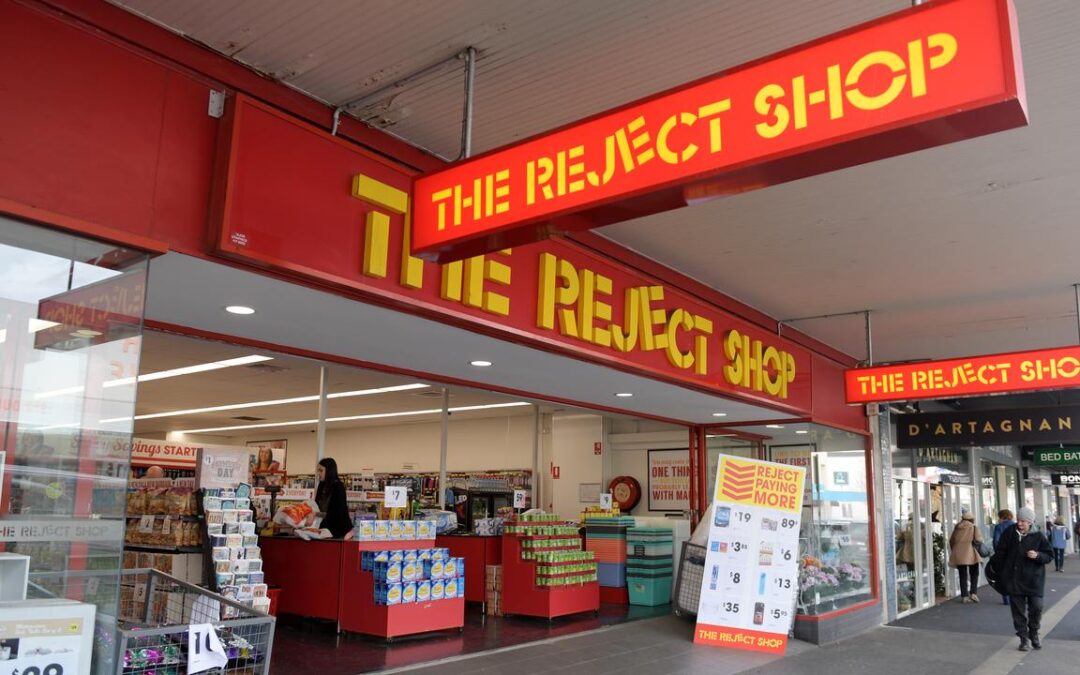
The Reject Shop name getting rejected by Canadian owner
The Reject Shop’s name is on the scrap heap, as its Canadian parent company plans to nearly double its store locations over the next decade.
The 395-store Australian discount chain was acquired by Canadian retailer Dollarama for $259 million in April, expanding its fleet to more than 1,600 stores globally.
CEO Neil Rossy told analysts last week that the Canadian company plans to convert all Reject Shop stores to Dollaramas by 2026/27, with four conversions already underway.
“It will be a gradual phase-in, again over the next several years, each year, ramping up the number of store conversions that we’re able to execute.”
A spokeswoman told AAP on Tuesday that only once a location contains a “critical mass” of Dollarama products would it be brought under the Dollarama banner.
“This will be a multi-year process,” they said.
The company’s long-term target is to reach 700 stores in Australia by 2034, Mr Rossy said.
Mr Rossy said the plan was to convert store layouts into a “convenient and consistent shopping experience we are recognised for,” as well as simplifying the price point structure, including the current pricing ceiling.
Dollarama prides itself on selling items “for $5 or less.”
The Reject Shop has been part of the Australian retail landscape for 44 years, with stores in every state except the Northern Territory.
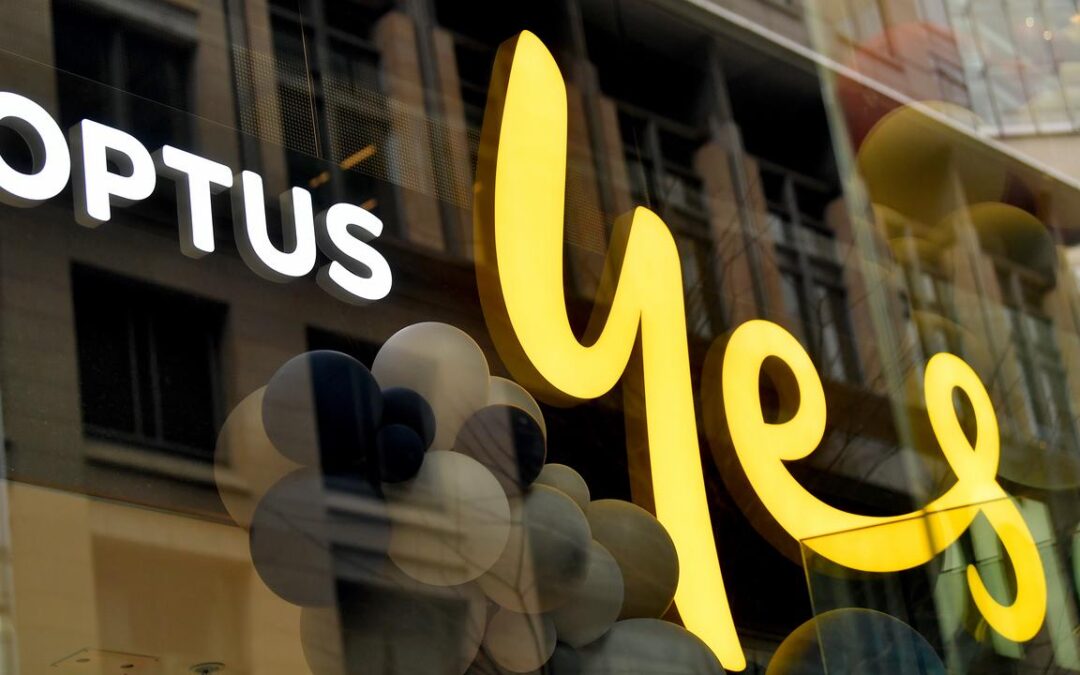
Deaf, non-verbal man among ‘inexcusable’ Optus targets
Optus signed up a homeless, non-verbal, deaf amputee to five contracts and then resisted complaints about its sales practices, a court has been told.
The disability pensioner’s plight was highlighted in the Federal Court in Adelaide on Tuesday after the telco agreed to pay a $100 million penalty.
Optus and Australia’s competition watchdog are seeking court approval for the hefty fine after the company admitted in June to breaching consumer law.
It has accepted sales staff acted unconscionably when selling phones and contracts to more than 400 people at 16 stores nationwide between 2019 and 2023, including vulnerable customers such as Indigenous and intellectually disabled people.
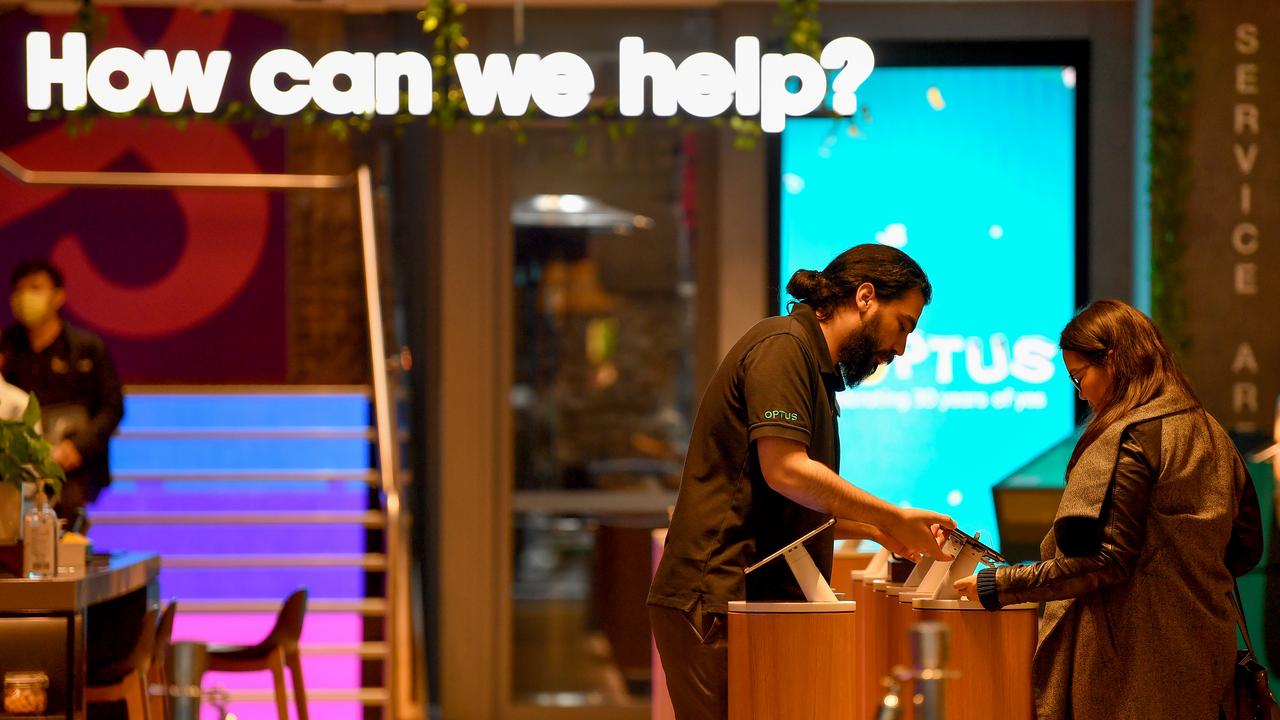
Judge Patrick O’Sullivan heard submissions from the nation’s second-biggest telco and the Australian Competition and Consumer Commission during the Federal Court penalty-phase hearing.
Sam Duggan, for the ACCC, cited the example of a disability pensioner who “was homeless, lived with deafness and was mute and had parts of his fingers and hands amputated”.
He had “very limited ability to use technology” and his sole income was the disability pension.
Despite this, Optus’s Westfield Marion store in Adelaide sold him two phones, three phone plans and two accessory bundles with a total value of $7542.
The man’s support co-ordinator, who spent months trying to resolve the complaint without success, was told by Optus staff they could not speak to him until they had spoken to his client, even though the man was deaf and non-verbal.
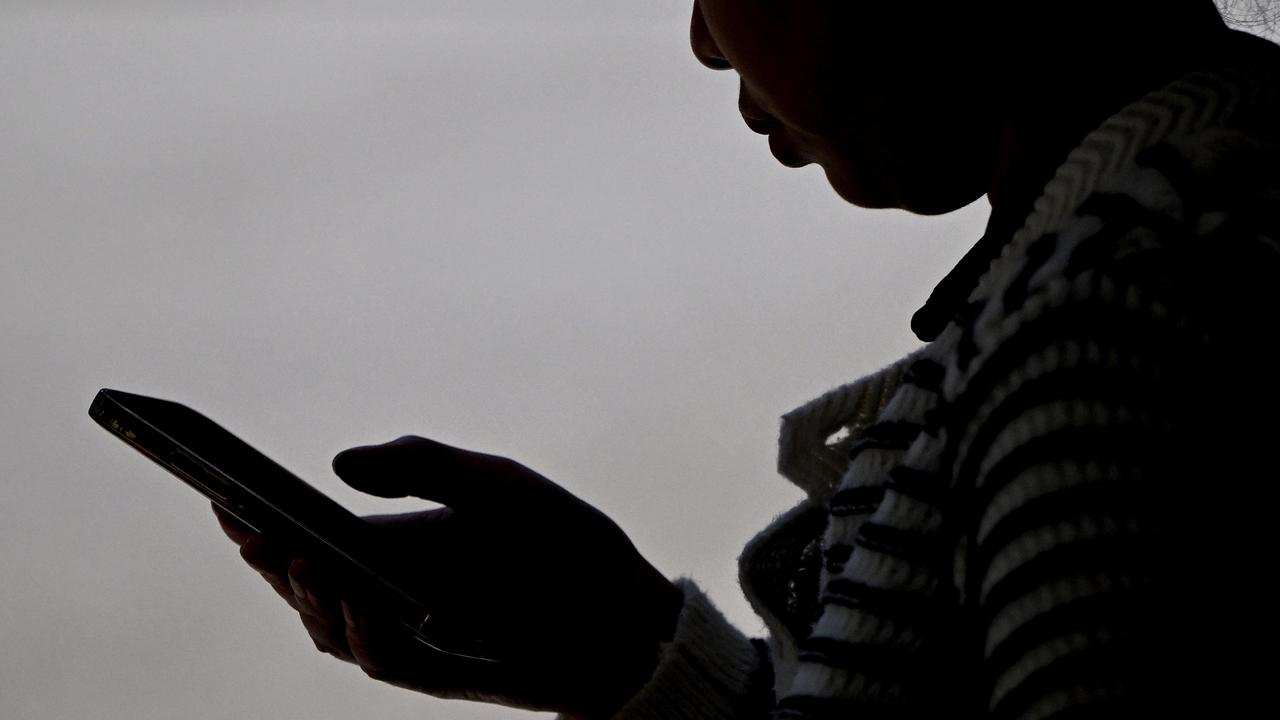
Steven Finch SC, for Optus, told the judge that “we emphatically accept this (hearing) is not a rubber-stamp exercise that we’re asking you to undertake”.
“Optus sincerely apologises to all the customers affected by the misconduct, which we accept was inexcusable and unacceptable,” he said.
“These apologies are not empty words or merely a promise to do better, because … there has been an extensive remediation and reconstruction plan … which are enforceable in this court.”
Key steps taken include improved credit checks, training for sales staff, a remediation program, 34 licensee stores switching to direct management by Optus and a $1 million donation to support digital literacy for Indigenous people.
Mr Duggan also cited the case of another customer who was signed up to seven contracts totalling $21,450 at Optus’s Munno Para store in Adelaide.
“(Her) parents contacted Optus and explained that she was on a disability pension, lived with an intellectual disability, did not have the capacity to understand written documents and could not make financial decisions due to her disability,” he said.
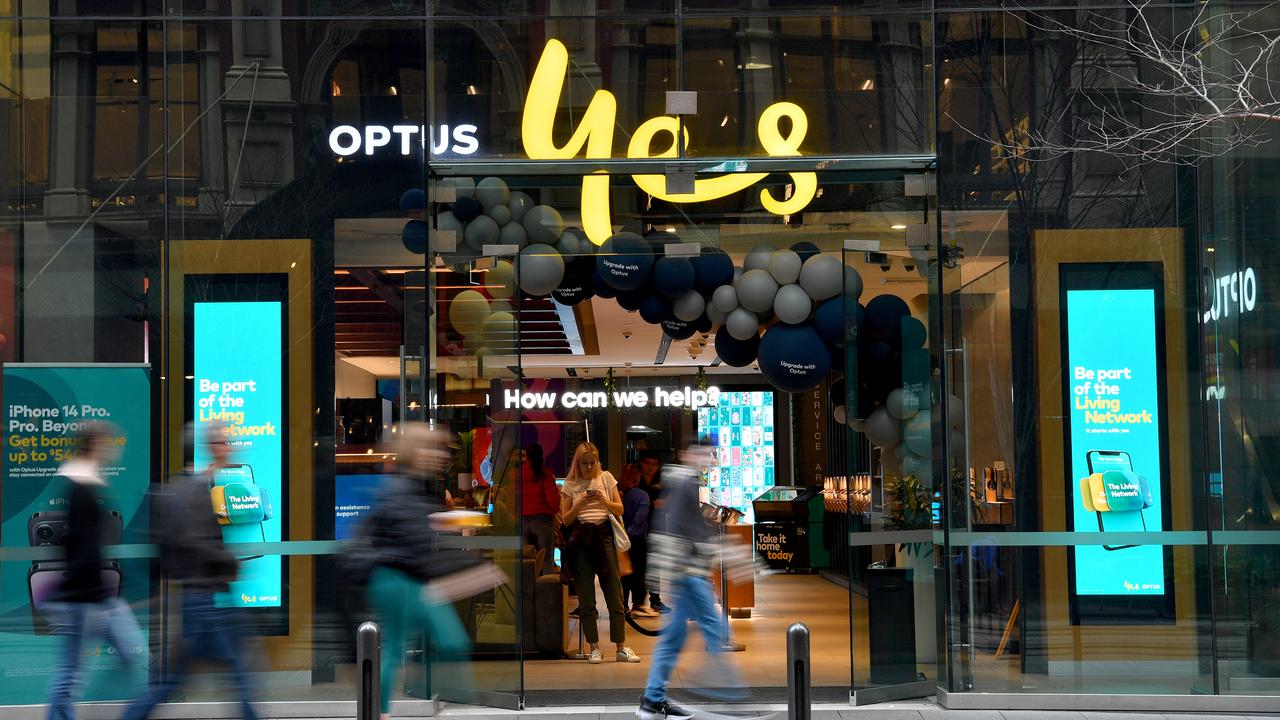
Optus sales staff used false information when conducting credit checks on the woman.
But after a complaint to the Telecommunications Industry Ombudsman, Optus management did not identify any issues or breaches.
“Optus now accepts that the conduct in relation to (the customer) was unconscionable and we say obviously so from that description,” Mr Finch said.
The ACCC considered the conduct of Optus staff in its Palmerston and Casuarina stores in the Northern Territory to be the “most serious”.
It found that 564 consumers – many of them Indigenous – signed contracts worth $650,000 that were the result of inappropriate sales practices.
Judge O’Sullivan has reserved his decision on the penalty to be imposed on Optus.

Kids unknowingly targeted with AI abuse apps, images
Children are being routinely targeted with AI-powered technology that allow users to generate sexual images of them from online photos, prompting a push for urgent legal changes.
These technologies, which allow users to insert a person’s photos and use generative artificial intelligence to sexualise them and create child abuse material, are proliferating.
There has been a 1325 per cent surge in AI-related child sexual exploitation reports, with more than 67,000 made in 2024, according to the US National Centre for Missing and Exploited Children.
Independent MP Kate Chaney has introduced legislation to criminalise a person having access to technology that has the sole purpose of generating child sexual abuse material.
Possessing such technology would carry a prison term of up to 15 years under her bill.
Ms Chaney brought together governmental representatives, law enforcement and child protection advocates at a roundtable at Parliament House on Tuesday to discuss the issue.
Former Australian of the year Grace Tame said offenders were using increasingly sophisticated technology to produce child abuse material, such as AI apps that allow perpetrators to create content en masse.
“The nature of it is worsening because of AI tools that are enabling offenders to make their methods of abuse more sophisticated, as well as make their methods of evading justice more sophisticated,” she told reporters.
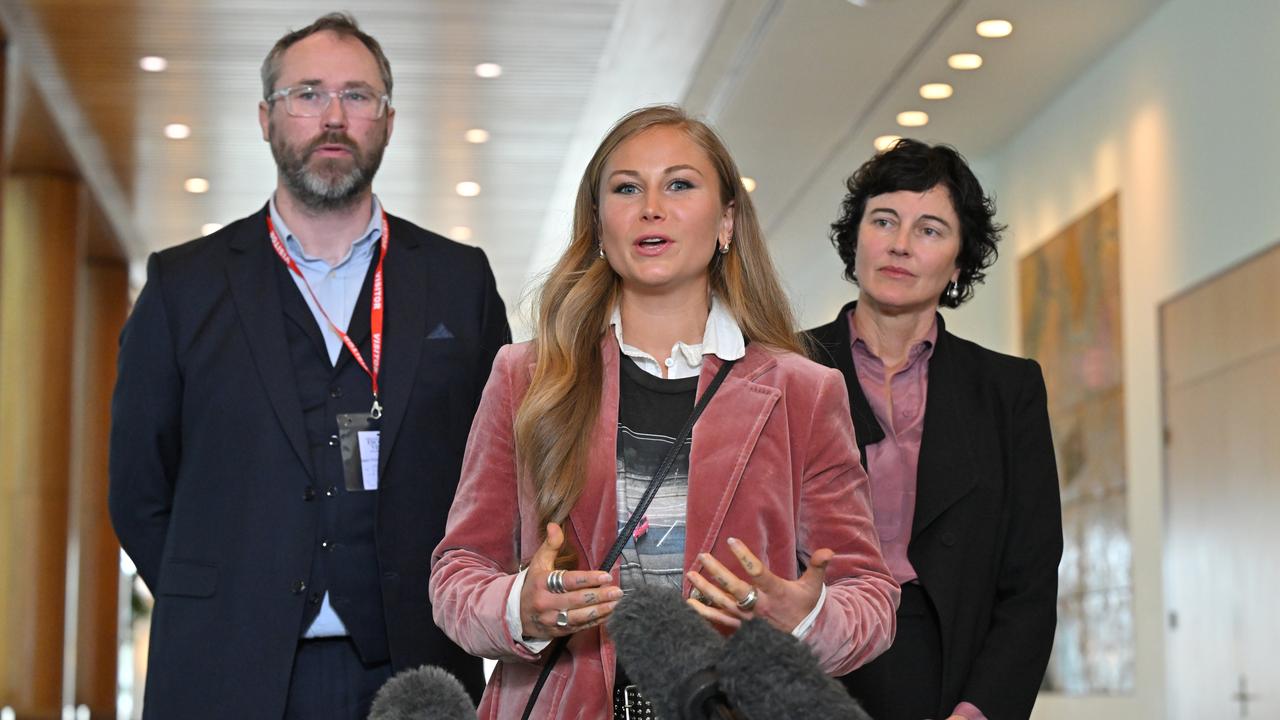
Sarah Napier from the Australian Institute of Criminology, whose research focuses on child exploitation, said she had seen offenders take non-sexual images of kids from social media and turn them into child abuse material.
“So even if a child hasn’t been a contact victim of child sexual abuse, they are still being victimised without their parents knowing, without them knowing, and their photos are circulating around on the internet,” she said.
One in 10 adolescents had been sexually extorted and about 40 per cent of that cohort said it happened using AI-generated material, Dr Napier said while pointing to research from the institute.
“Most of them were sexually extorted under the age of 15 years old and the most common age to be sexually extorted was around 14, 15,” she said.

International Centre for Missing and Exploited Children chief executive Colm Gannon said the technology could already be tracked with systems in place in Australia with the help of universities and researchers.
Open-source AI models are commonly uploaded online, providing people with public access to a back-end they can build on.
Specialised add-ons that enable the generation of child abuse material could be added to open-source models and this was the technology law enforcement would be able to target if it was criminalised, Mr Gannon said.
“Criminal intent is always going to be there but there also has to be criminal responsibility,” he said.
Communications Minister Anika Wells pledged to work with the industry on swift reforms that would be “as tight as possible” to stop people accessing apps that sexualise kids.
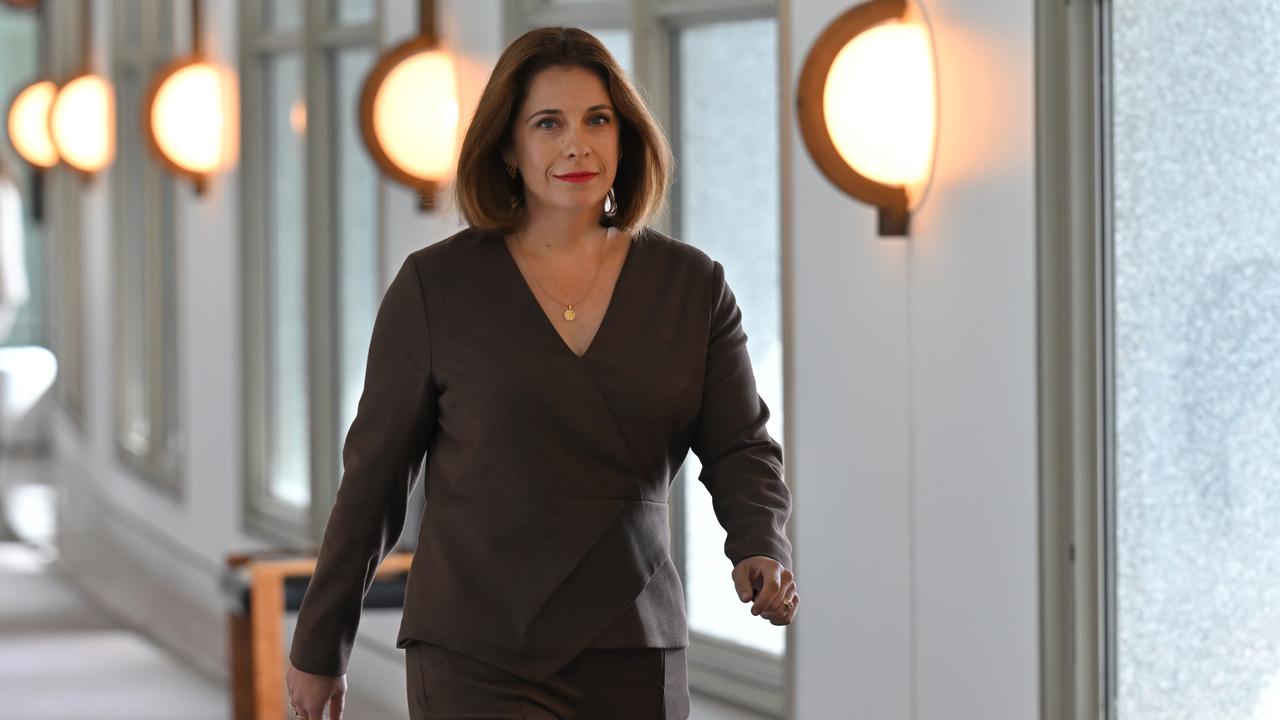
“One child in every classroom in Australia has now been a victim of deep fake imagery,” she said.
“These apps are only designed to abuse, to believe, to humiliate and to harass, and we are determined to restrict them.”
The onus would also be on tech companies to prevent the availability of “nudifying” tools and there would be consequences for failures, Ms Wells added, although she didn’t outline a timeline for reform.
“Maybe the eSafety commissioner could block these apps from being on app stores or websites, maybe we could direct the platforms to take them down or to be responsible for taking them down in the first place,” she said.
1800 RESPECT (1800 737 732)
National Sexual Abuse and Redress Support Service 1800 211 028
Lifeline 13 11 14
Kids Helpline 1800 55 1800 (for people aged 5 to 25)
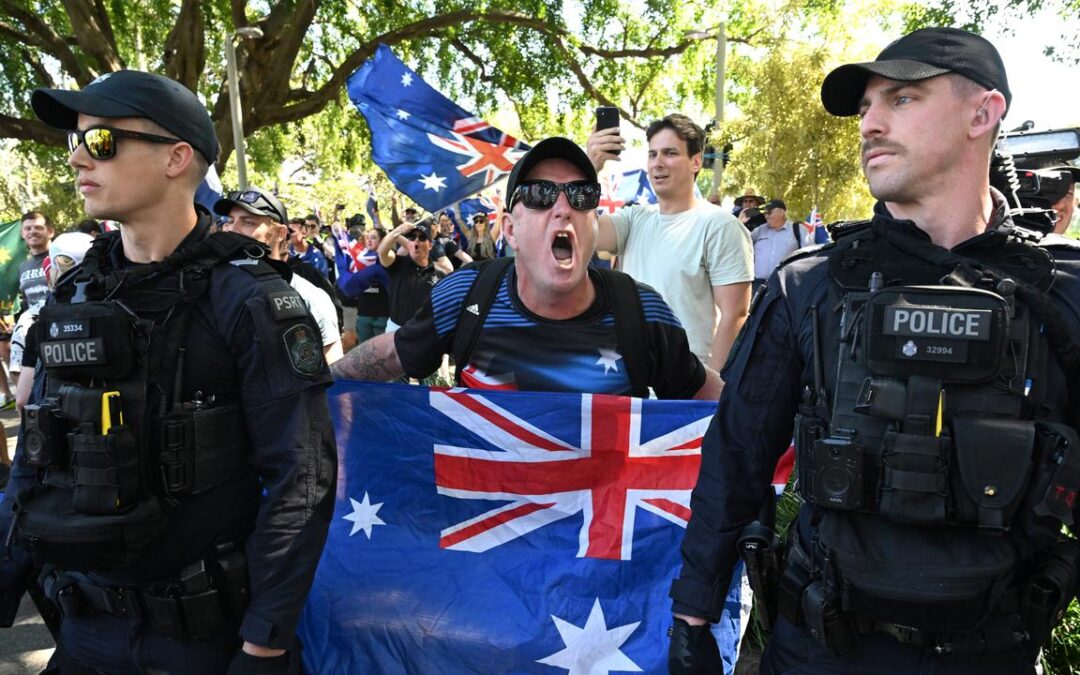
Violent protests fail to sway national migration plans
Violent protests calling for the national migrant intake to be curbed have failed to make an impact, as key immigration figures reveal Australia’s migration numbers will remain at current levels.
The permanent migration program intake for 2025/26 will be set at 185,000 people, the same as the previous financial year.
The announcement of the intake levels follows anti-immigration rallies attended by thousands of protesters in capital cities across Australia on Sunday.
Immigration Minister Tony Burke said the decision to keep migration numbers on hold followed talks with states and territories, with a focus on skilled migration.
Health Minister Mark Butler acknowledged many Australians held legitimate concerns following a spike in immigration numbers post-COVID, saying the government needed to get the balance right on population growth amid housing strains and workforce shortages.
Pandemic-era border closures caused the net overseas migration figure to plummet.
When borders reopened, an influx of international students caused the net increase to surge to a record high of 536,000 in one year.
Numbers had fallen since and Mr Butler said the rate would continue to come down to normal levels.
“I think there is a real tension between recognising that there are real pressures on our housing system and other parts of the economy,” he told Nine’s Today Show on Tuesday.
“While also, I know intimately, recognising we’re really struggling to get the workers we need to deliver the hospital services, the aged care services and build the houses we need.”
Neo-Nazi Thomas Sewell, who addressed the rally in Melbourne and was shown in footage alongside black-shirt clad people attacking an Aboriginal camp, crashed a press conference being held by Victorian Premier Jacinta Allan on Tuesday.
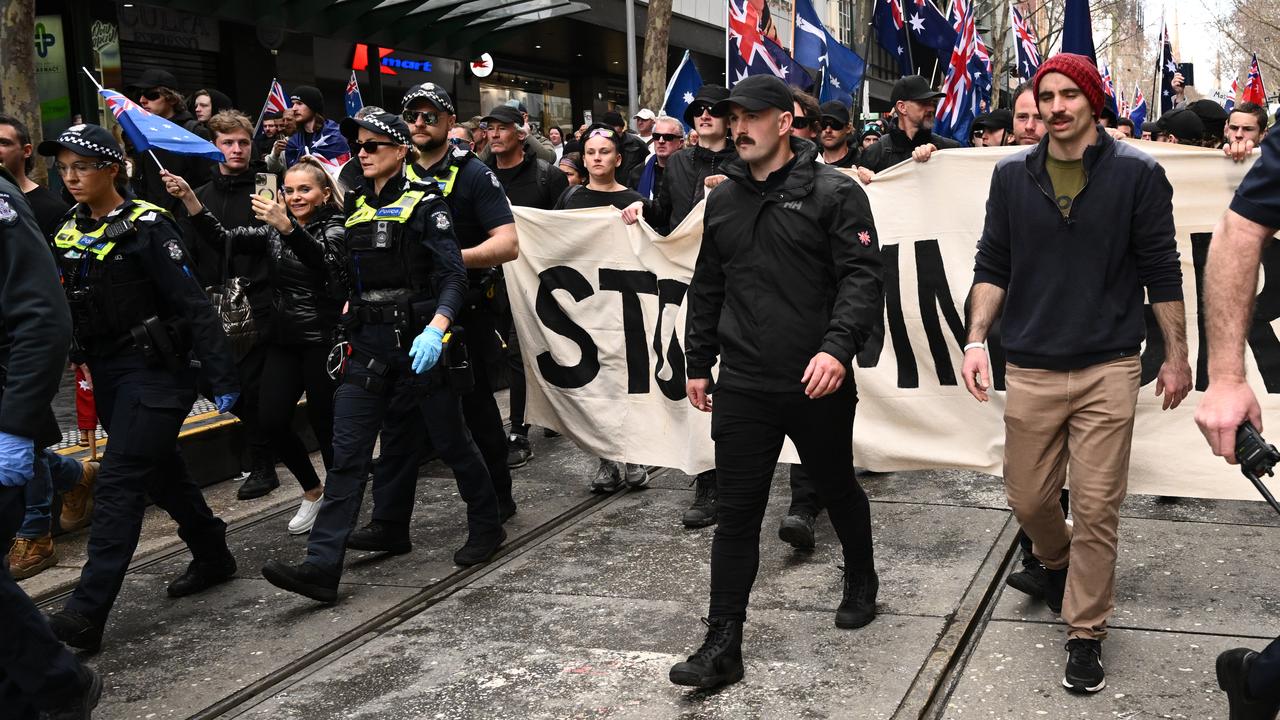
He shouted about Australians being denied the right to protest as he was escorted away by police officers.
Prime Minister Anthony Albanese said the prominence of neo-Nazis at the rallies needed to be confronted.
“We have to make sure we give people space to move away and to not push them further down that rabbit hole,” he told a Labor Party room meeting in Canberra.
“A lot of these fears are being reinforced online and we have challenges with polarisation.”
Independent senator David Pocock and former Immigration Department deputy secretary Abul Rizvi said the government had left a vacuum for unsavoury elements, including neo-Nazis, by failing to show leadership and properly explain its immigration plan to the public.
The rallies have been widely condemned because of the presence of neo-Nazis, but politicians including One Nation senator Pauline Hanson and Queensland MP Bob Katter joined marchers.
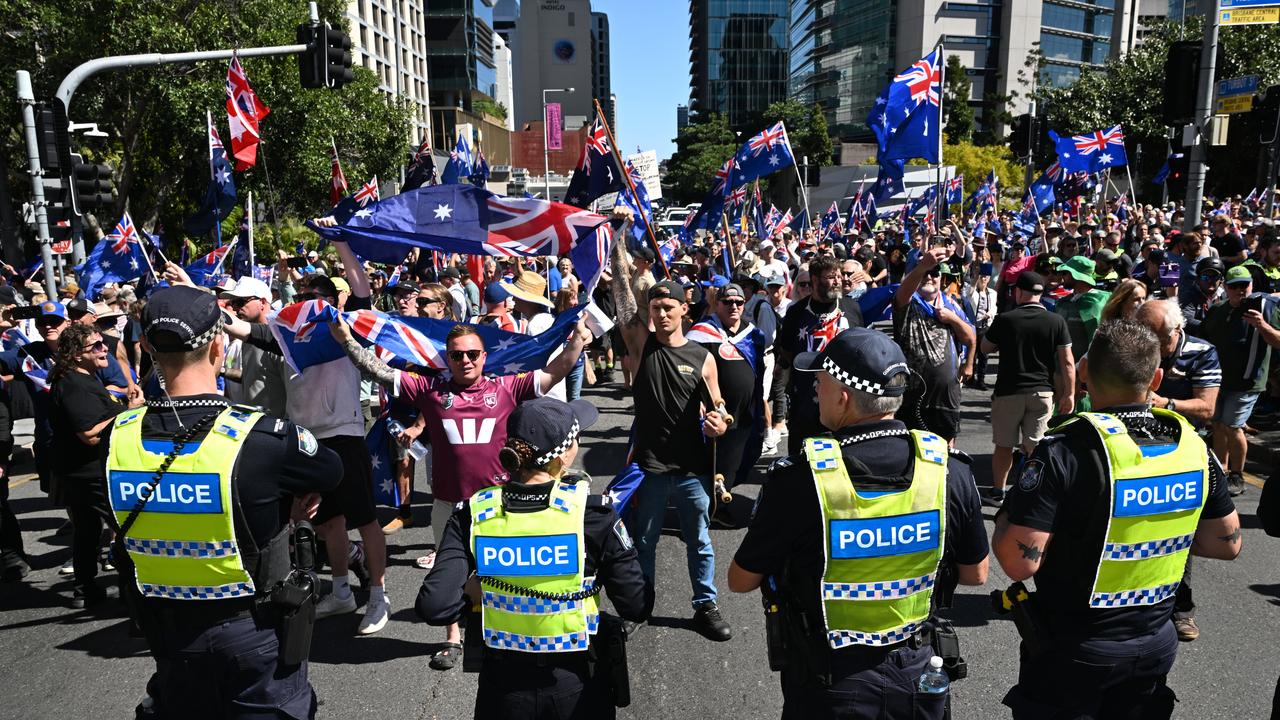
While only a small contingent of the people who showed up identified as white nationalists, terrorism expert Levi West said there was an overlap that extremists could exploit.
“A rally that has a presence from a group like the neo-Nazi organisation presents a prime opportunity for recruitment,” said Dr West, a research fellow at the Australian National University.
“People whose grievances are potentially based in conspiracy theory or misinformation can quite easily be drawn towards the simplicity of the ideas that are embedded in neo-Nazi ideology as providing some sort of solution or solace for the thing that they feel a grievance about.”
Simon Welsh, director of research at pollster Redbridge, said surveys and focus groups were picking up concerns among the general public about the size of Australia’s migration intake, in the context of the housing affordability crisis.
“But there is some important nuance here,” he told Sky News.
“There’s this sensitivity to the idea of politicians using (immigration) as an excuse to not do proper reform on issues like housing or on health and education.”
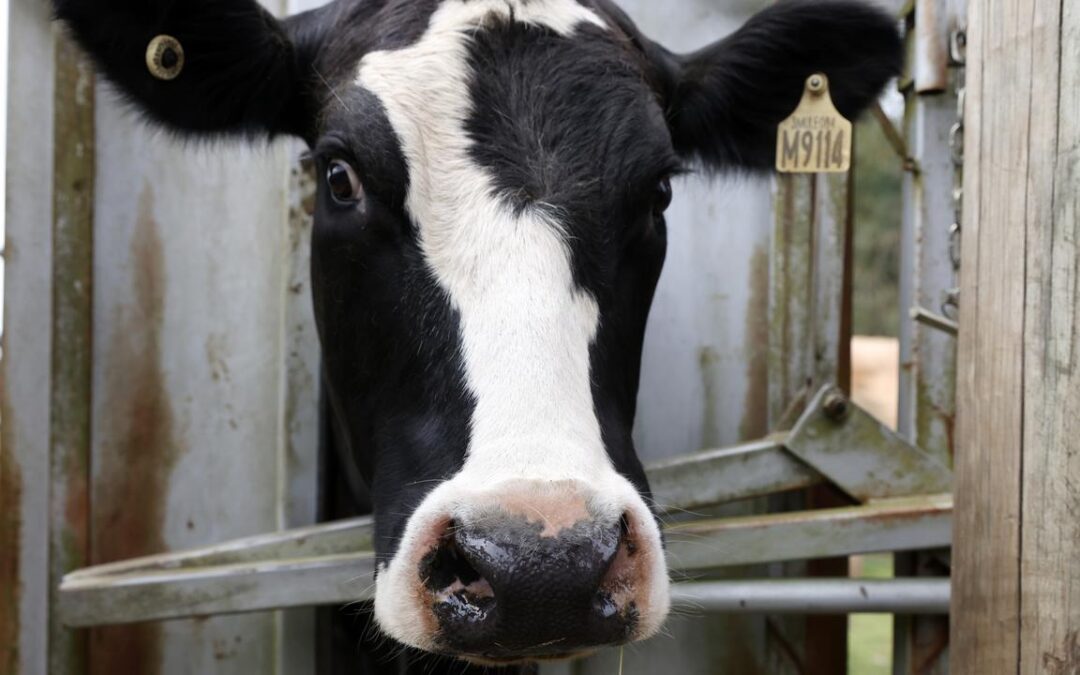
Record forecast for Australia’s world-class agriculture
The price of livestock is set to tick Australia’s agriculture, fisheries and forestry production value to a record of more than $100 billion.
Beef, lamb and milk products have boosted overall agriculture sector production with this financial year’s forecast a good omen for producers around the nation, the federal government’s commodities forecaster says.
However, crop production value is set to fall over the next 12 months following rainfall through July in South Australia and Victoria.
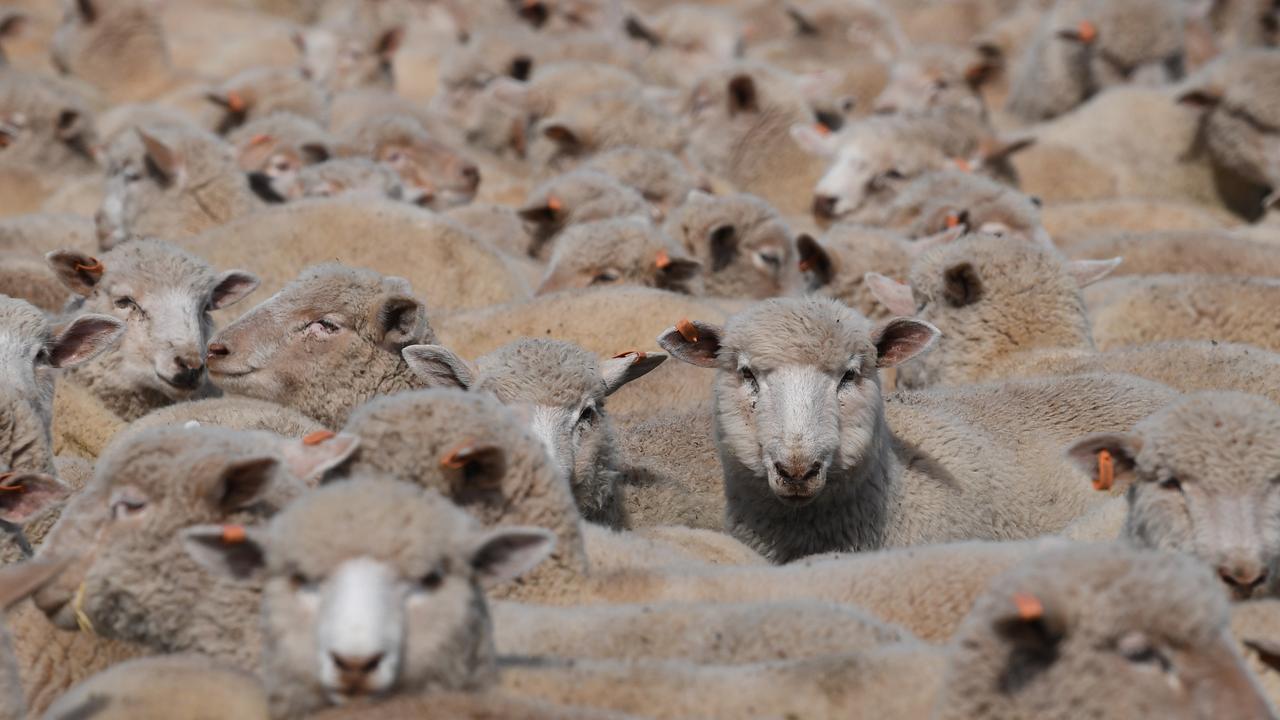
There are also concerns for southern NSW due to a slow start to the winter cropping season and relatively low soil moisture levels.
The Australian Bureau of Agricultural Resource and Economics and Sciences, released its commodities report for the 2025 September quarter on Tuesday.
It shows livestock and livestock product values will rise due to “robust” global demand and re-stocker activity driving higher prices.
The bureau’s executive director said the new record value was mostly down to livestock.
“We’ve seen high prices lately for both livestock and animal products, like beef, lamb and milk,” Jared Greenville said.
“This has boosted the value of livestock production to $41.6 billion, helping to drive overall agriculture sector production value to a forecasted $94.7 billion, which would also be a record.”
Australia’s gross gross agricultural production is forecast to rise by $685 million in the financial year.
Livestock and livestock product values are forecast to rise by $1.1 billion in 2025–26.
Lamb and sheep slaughter are up $500 million, milk $400 million and cattle $200 million.
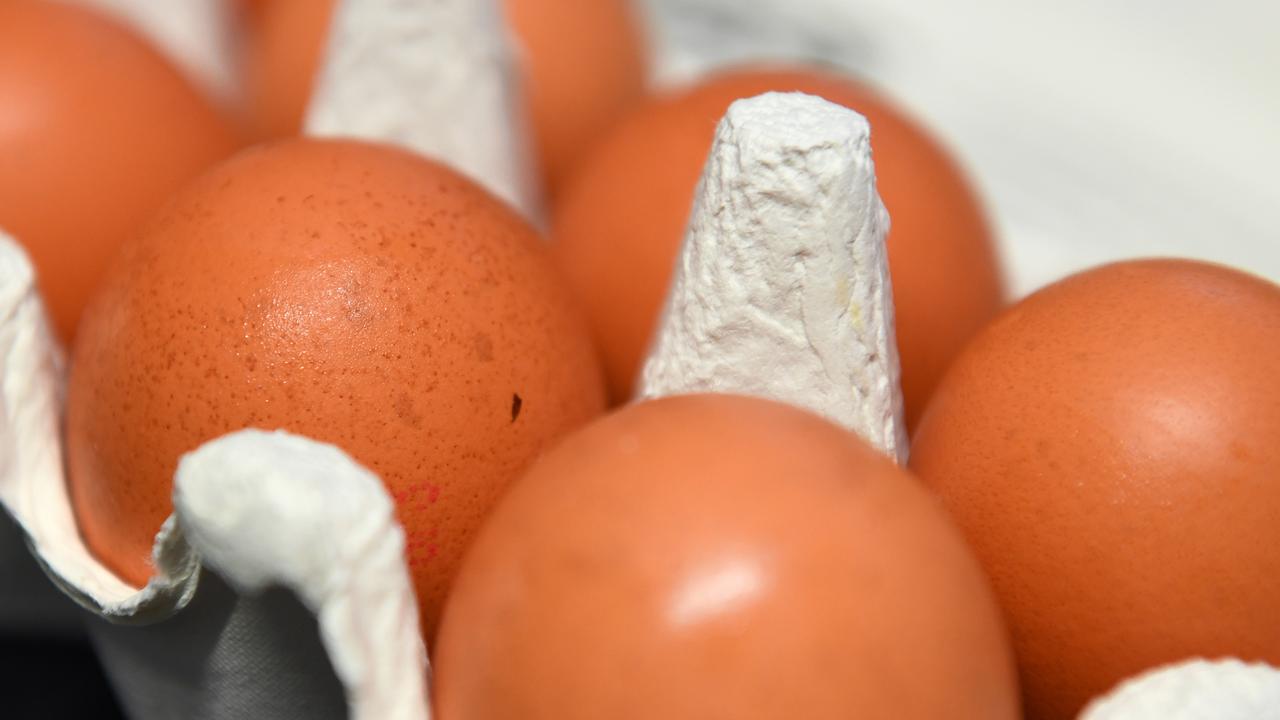
Pigs, poultry slaughtering and egg production have risen by $200 million as rising domestic production volumes “more than compensate for slightly lower prices for poultry meat”, the report said.
But on the flip side, total crop production value will decline year-on-year, with lower domestic prices more than offsetting a small rise in output volume.
“While declining somewhat from 2024–25, if realised, the forecast value of crop production would be the third highest on record,” the report said.
“Favourable seasonal conditions in winter, combined with a positive spring outlook, will support strong production volumes.”
Agriculture, Fisheries and Forestry Minister Julie Collins said the record result stems from the hard work, resilience and skill of farmers working collaboratively with government.
“The continued growth in our agriculture, fisheries and forestry sector is good for our farmers, it’s good for our regional economies, and it’s good for our trade relationships,” Ms Collins said.
“This record forecast is not only a result of increased demand for our world-class products, but what you can achieve when government works with industry to deliver for them.”